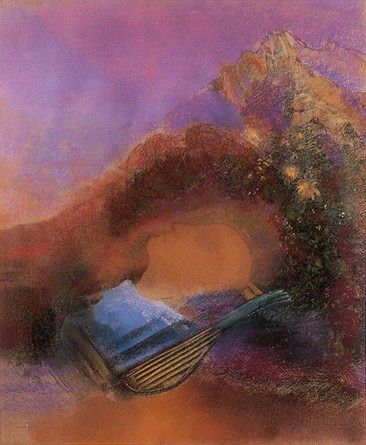Cards In This Set
| Front | Back |
 A/t/d/? |
Paul Gauguin
Vision after the Sermon (Jacob Wrestling with the Angel), 1900
Symbolist |
 A/t/d/? |
Paul Serusier
Landscape: the Bois d’Amour
(The Talisman), 1900
Talisman for the Nabi group, use of color as emotive expression.Nabi, Symbolist |
 A/t/d/? |
Edouard Vuillard
Interior with Work Table (also known as The Suitor), 1895
SymbolistAssociated with nabi, decorative art. |
 A/t/d/? |
Pierre Bonnard
Dining Room on the Garden, 1935
Decorative art, family environmentsNabi |
 A/t/d/? |
Odilon Redon
Orpheus, ca. 1915
Symbolist, focused on dreams and mythNo regard for traditional color use, paints cloudlike |
 A/t/d/? |
Gustave Moreau
The Apparition, ca. 1875
Symbolist, mythology expressed with impressionist style. |
 A/t/d/? |
Gustave Klimt
Adele Bloch-Bauer I, 1905
Art Nouveau/Symbolist decorative images of women, gold leaf, patterns, flat space. |
 A/t/d/? |
Gustave Klimt
Hope II, 1905
Art Nouveau/Symbolist, alienated, disturbing yet beautiful, femme fatale. |
 A/t/d/? |
Edvard Munch
The Dance of Life, 1895Symbolist, dealt with femme fatale, sorrow, due to the loss of his mother and sister.
-signature lamppost-summer night - sexual revival |
 A/t/d/? |
Edvard Munch
The Scream, 1895
Symbolist, figures are grotesque and isolated, alienated from society dealing with the terror of human existence. |
 A/t/d/? |
Henri Matisse
Male Model (L’Homme Nu), 1900
FauvismAttempt at an academic study painted in a non traditional way, lack of finish. |
 A/t/d/? |
Henri Matisse
Luxe, calme et volupté, Paris, autumn-winter, 1905
Fauvism, inspired by cezanne and signac with pointillism at times, As a result, Matisse produced his Neo-Impressionist masterpiece Luxe, calme et volupté -stronger diagonal-figures nude curved forms |
 A/t/d/? |
Henri Matisse
The Open Window, 1905
The theme of an open window in Matisse's work is a recurring theme throughout his long career.Uses color to the extreme to try and make the viewer experience his personal view/world. |
 A/t/d/? |
Henri Matisse
Portrait of Mme. Matisse (The Green Line), 1905- les fauves "the wild beasts" fauvist-clashing colors, juxapose (cheverels color theory) no rhythms or patterns -unfinnished
|
 A/t/d/? |
Henri Matisse
Le bonheur de vivre, 1905
explores female nudefauvistjoyful, not disturbing like his other work can be, strong outlines, abstracted, fantasical land.
|



